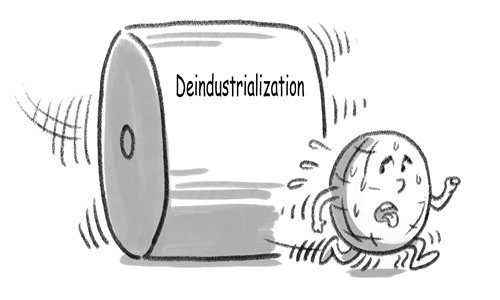Deindustrialization needs modern governance tools

Illustration: Liu Rui/GT
Deindustrialization has become a global challenge related to governance, and linked to social unrest and economic chaos in parts of the world.
Over the past two to three decades, almost all developed countries have experienced shakeout in industries, shrinking workforce and the substitution of human labor by machines, especially in manufacturing. The process has been prominent even in economies such as India and Brazil, which have not yet completed their industrialization.
Deindustrialization has directly led to stagnation and even a decline in GDP growth. Social connections built upon large factory-based communities have faded, and people who shared the same interests have dispersed due to job changes.
Semi-skilled and unskilled workers, unable to bear the pressures of living in big cities, have returned to small and medium-sized towns and villages, widening the urban-rural gap. Surveys suggest that life expectancy started to decline in some deindustrialized areas in the US a few years ago.
Besides, a significantly weakened role for trade unions has become apparent in the West. Governance in most European countries is based on a balance of three forces: government (which is in charge of taxation, welfare and education), capital, and trade unions. Weak trade unions have resulted in poorer control on power of capital, thus causing greater economic inequality.
It is extremely hard for these economies to reindustrialize. US resonating narrative of reviving the country's manufacturing is nearly impossible. There is no precedent worldwide for a deindustrialized country to become reindustrialized.
Deindustrialization has caused decentralization of the middle class in some developed countries, while increasing the difficulty of giving shape to these important strata of society in developing economies.
Developed countries usually started deindustrializing after having completed industrialization and established welfare systems. But developing countries like India have begun to deindustrialize even before the process of industrialization is completed. Therefore, the process of modernization will be tougher for them. In the history of global development, there has hardly been a country which achieved modernization without realizing industrialization first.
In China, 7 to 8 million graduates entering the job market annually may not work as workers, since their aim to get educated is not to walk the path of their parents - to till land or sit aside a machine for over eight hours. There are millions of people who have found jobs in courier service. Such employment stems from the popularity of e-commerce, a modern business phenomenon different from manufacturing. Many young and middle-aged people have received education, but are not capable of acquiring advanced skills. They are constrained by the lack of vertical mobility at the work place. This group of people has become the key to social stability.
Due to deindustrialization, the middle class has regrouped on the basis of industries, ethnic groups, genders and regions. Manifold problems have appeared in today's society. For example, groups may be formed through #Metoo movement and on basis of sexual orientation. Their appeal is scattered, or contradictory, or even extremist at times. Their discontent tends to accumulate and their voices tend to be amplified by social media. When they realize that their voices cannot be heard by the powers-that-be, they will take to the streets, like the "yellow vest" protesters in France.
The influence of deindustrialization is profound, triggering changes in the economic and social structures. However, the attention society is paying to this issue is still far from enough. Most original governance models have been established on the experience of industrialized economies. They are hence weak to deal with changes brought about by deindustrialization.
It is especially apparent in developed countries. Almost all of them still deal with social change brought about by deindustrialization by using old governance tools borne out of the original political framework, baring the difficulties of keeping pace with the demands of modern governance.
The author is a senior editor with People's Daily, and currently a senior fellow with the Chongyang Institute for Financial Studies at Renmin University of China. dinggang@globaltimes.com.cn. Follow him on Twitter @dinggangchina

